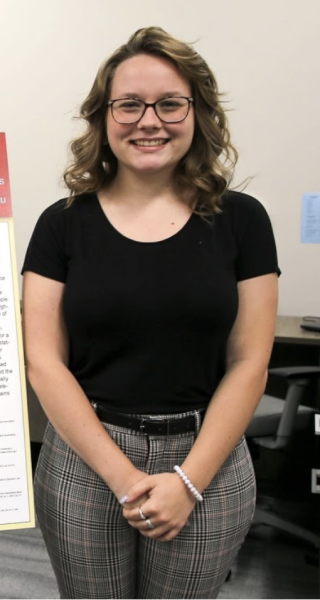November 3, 2023/12:00a.m.
On Tuesday, October 24 Gannon welcomed author Dr. Mona Hanna-Attisha for a discussion about her book What the Eyes Don’t See: A Story of Crisis, Resistance, and Hope in an American City. Hanna-Attisha is a pediatrician whose book brought light to the injustice that occurred in Flint, Michigan between 2014 and 2019.
The water crisis was affecting the children in and around the Flint area. The author herself said that the crisis will cause lasting issues for those who were exposed. Some of these issues lasting their lifetimes. Dr. Sarah Ewing, Provost of Gannon, introduced Hanna-Attisha saying, “[H]er ground-breaking work in exposing the Flint water crisis and her advocacy for the health and well-being of children has inspired countless individuals around the world.”
Dr. Ewing went on to discuss the accomplishments of Dr. Hanna-Attisha’s project and the subsequent book. “Social justice, environmental responsibility and the power of community activism” were some subjects to be highlighted in her introduction.
The Gannon Reading to Enhance Awareness of a Diverse Society (Gannon READS) program exposes students to stories and information they may not have known about otherwise. This event was required for all first-year students, but many others were in attendance. Dr. Hanna Attisha’s book has been taught in first-year student introductory courses.
The three things that are highlighted by Dr. Ewing demonstrate the importance of Gannon READs as a growing program. Students need to be informed of occasionally difficult topics that can bring a worldly perspective into the classrooms on campus. Being able to talk with Hanna-Attisha and gain the perspective of someone who had been in the center of this environmental crisis is an immeasurable privilege.
One student in an interview discussed how fundamental Dr. Hanna-Attisha’s past was to her book and her connection to Flint. This student highlighted the importance of Hanna-Attisha’s personal experiences throughout the novel. During the event Hanna-Attisha talked about her own expectations and the direction of her life that she never intended to write a book. “…[I]t took me awhile, but I finally committed to writing a book because it was an important story to share so that we don’t keep having these kinds of stories.”
Preventing the repetition of history was highlighted by Dr. Hanna-Attisha’s talk. Those in attendance may remember her saying “I was raised to know what people in power could do to vulnerable populations.” Hanna-Attisha found this vulnerability in the people of Flint. Keeping people safe in their own “backyards” (in this circumstance the United States, or even more narrowly Michigan) should be just as important as sending a mission trip to a place such as Hati.
Dr. Hanna-Attisha said that while bringing safe drinking water to Hati has value, bringing water and supplies to those just miles away needs to be recognized as well. The lead that was in the water in Flint Michigan was brought into the spotlight thanks to Dr. Hanna-Attisha.
Her research was made public, and the backlash she received was brutal. Her book is available at the Gannon bookstore. Pick up a copy to discover how she overcame each obstacle and how her past prepared her for her fight against those in power to seek justice for those who may not be able to find it themselves.








